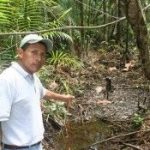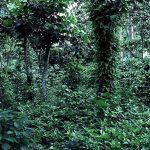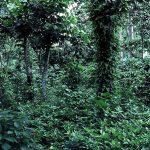
This incident in this report highlights ongoing border challenges, with Guatemalan incursions into Belize for illegal logging becoming increasingly bold and frequent, straining local resources and conservation efforts.
Remote sensing by satellite shows that 15-30% of annual deforestation in Nicaragua, Honduras and Guatemala can be attributed to the movement of cocaine alone, the paper says. Half of Central America’s resident and migratory bird populations have fallen since 1970 and deforestation is a key driver of that decline.
Original paper can be accessed here: Intersection of narco trafficking, enforcement and bird conservation in the Americas | Nature Sustainability
Guаtеmаlаn еnсrоасhmеnt іn Веlіzе’ѕ рrоtесtеd fоrеѕtѕ hаѕ rеѕultеd іn thе dеfоrеѕtаtіоn оf аn аrеа nеаrlу thе ѕіzе оf Веlіzе Сіtу, ассоrdіng tо thе Веlіzе Теrrіtоrіаl Vоluntееrѕ (ВТV). Тhе ВТV аllеgеѕ ехtеnѕіvе іllеgаl lоggіng, роасhіng, аnd fаrmіng wіthіn thе Сhіquіbul аnd Саrасоl рrоtесtеd аrеаѕ. Тhе grоuр сrіtісіzеѕ whаt thеу реrсеіvе аѕ а lасk оf dесіѕіvе асtіоn bу Веlіzеаn аuthоrіtіеѕ tо аddrеѕѕ thе іnсurѕіоnѕ. Тhіѕ іѕѕuе іѕ раrt оf а lоng-ѕtаndіng tеrrіtоrіаl dіѕрutе bеtwееn Веlіzе аnd Guаtеmаlа. Vіоlеnt іnсіdеntѕ hаvе рrеvіоuѕlу оссurrеd, іnсludіng thе 2014 ѕtаndоff bеtwееn аrmеd Guаtеmаlаn nаtіоnаlѕ аnd Веlіzеаn соnѕеrvаtіоn wоrkеrѕ.
According to Global Canopy, US$6.1 trillion in funding was provided to the 350 companies with the greatest risk exposures to tropical deforestation by some 150 financial institutions in 2023.
Through this exposure, land conversion presents numerous supply-chain risks to firms, namely:
- The reputational risks posed by adverse media (exacerbated further if linked to any human-rights abuses in the context of land conversion).
- The legal risks represented by increasing regulatory and legislative pressures on companies and financial institutions to prevent deforestation.
- The physical risks present, given that most bank-financed businesses and commercial services ultimately depend on natural capital and resources directly or through their supply chains. Aggressive consumption of resources reduces their availability in the long term, undermining sustainable development and creating economic instability. Indeed, the World Economic Forum (WEF) has estimated that at least 50 percent of global GDP is reliant on nature and warned that the impacts of climate change would significantly destabilise global trade.
According to Global Canopy, US$6.1 trillion in funding was provided to the 350 companies with the greatest risk exposures to tropical deforestation by some 150 financial institutions in 2023.
Through this exposure, land conversion presents numerous supply-chain risks to firms, namely:
- The reputational risks posed by adverse media (exacerbated further if linked to any human-rights abuses in the context of land conversion).
- The legal risks represented by increasing regulatory and legislative pressures on companies and financial institutions to prevent deforestation.
- The physical risks present, given that most bank-financed businesses and commercial services ultimately depend on natural capital and resources directly or through their supply chains. Aggressive consumption of resources reduces their availability in the long term, undermining sustainable development and creating economic instability. Indeed, the World Economic Forum (WEF) has estimated that at least 50 percent of global GDP is reliant on nature and warned that the impacts of climate change would significantly destabilise global trade.
Guatemala is now the third-largest palm oil producer after Malaysia and Indonesia (which produce 88% of the global supply). More than 60% of Guatemala’s plantations are certified by the Roundtable on Sustainable Palm Oil (RSPO). High certification rates are largely attributed to plantations owned by a handful of producers, making it easier to certify large chunks of the industry, according to RSPO.
Between 2009 and 2019, certified plantations showed 9% forest loss compared with 25% on noncertified plantations. The palm oil industry’s expansion in Guatemala is causing a huge transfer of rural territory from traditional subsistence farming communities to a handful of palm oil mill owners with consequences for wages and working conditions.
For the past 11 years, Global Witness has documented and denounced waves of threats, violence and killings of land and environmental defenders across the world, and 2022 marks the beginning of our second decade documenting lethal attacks. The world has changed dramatically since we started documenting these in 2012. But one thing that has not changed is the relentlessness of the killings.
Last year, at least 177 defenders lost their lives for protecting our planet, bringing the total number of killings to 1,910 since 2012. At least 1,390 of these killings took place between the adoption of the Paris Agreement on 12 December 2015 and 31 December 2022.
In the region of Quiché, Ixil Indigenous leaders are fighting against hydroelectric dams, illegal logging, and deforestation.
Facing institutionalized violence from the government and opposition groups, some Indigenous activists in Guatemala have no choice but to flee.
Drug trafficking, illegal mining, and illegal logging in Latin America not only fuel violence, but also destroy the environment. “There was record destruction of the Amazon in 2020, as the rainforest loss an area around the size of Belize, and the situation looks even bleaker in 2021,” Insight Crime, an organization that studies organized crime in Latin America, said in a December 2021 report.
Click here to access the Global Illegal Logging and Associated Trade (ILAT) Risk assessment tool and to download the Forest Trends User Guide describing the functionality of the ILAT Risk Data Tool.
Click here to access the Cattle Data Tool.







